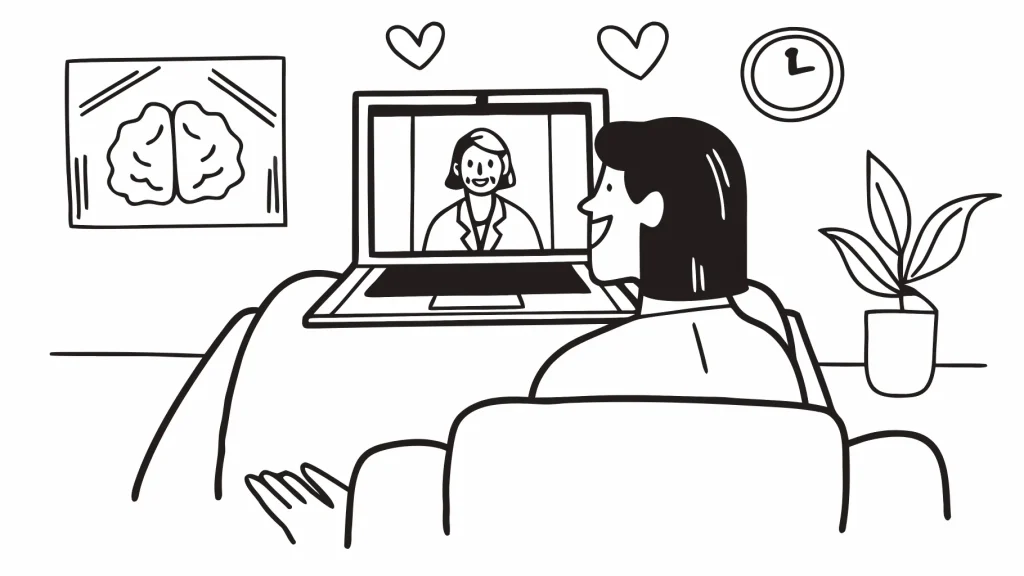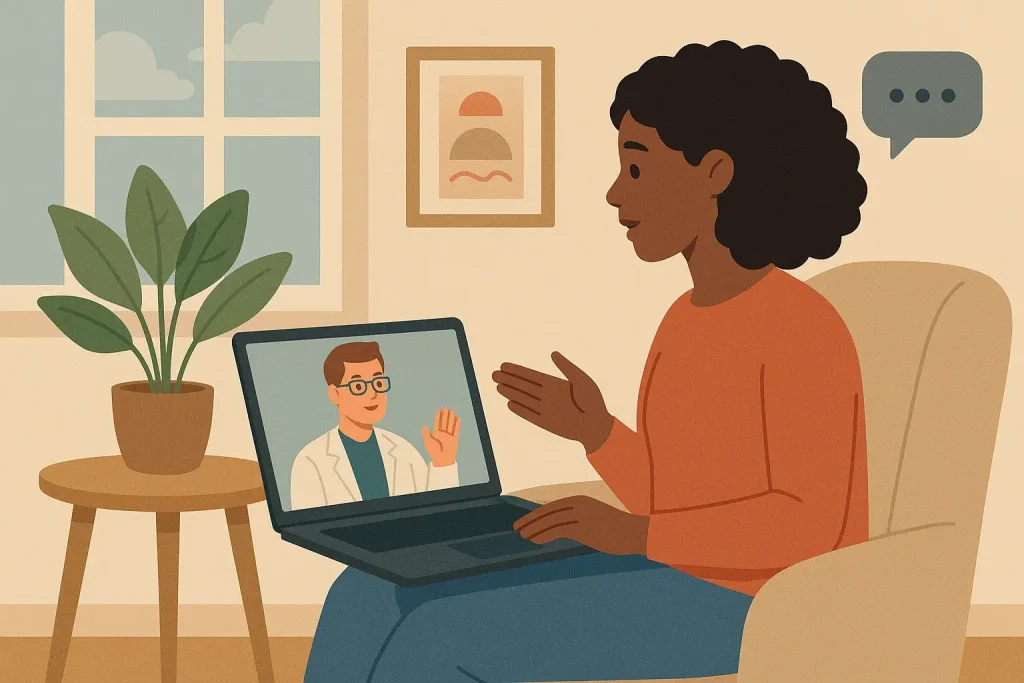With the rise of technology, the space of mental health has also revolutionized. Therapy was mostly stigmatized with sitting enclosed by four walls with a doctor and her notepad, judgmental looks of people around, or even long waiting times for an appointment. But since COVID, and the big shift to everything digital, even therapy found its breakthrough into online platforms. The growth in this market has been exponential. If we go by the statistics, it is projected to grow by a compound annual growth rate of almost 25.5%.
Through this article, we will dive deep into how this shift towards online therapy changed the way we approach mental health care and the positive impact it has brought up in the lives of countless people.
1) Bringing Therapy to Your Couch: What is Online Therapy?
Think of online therapy as a video call, but instead with an actual therapist and not your best friend. That’s what online therapy is. It is mostly conducted over online platforms such as Zoom, Google Meet, or any other video conferencing platform where you do not need to step out of your comfort zone, nor do you need to line up in long queues for your appointment. You simply choose or are appointed with a slot of mutual convenience, and you are good to receive the help that you need.
2) Evolution of Mental Health Care
2.1) The Traditional Therapy
Back in the day, if you wanted to go for therapy, you’d have to walk into a clinic, take an appointment, and wait for your turn. While this is still an approach for many, it is a barrier for others due to lack of time, money, or even due to geographical barriers. And not to forget the stigma associated with it.
2.2) The Shift Towards Digital Platforms
With the rise of COVID and quarantine being the need of the hour, people were locked in. The nature of the virus didn’t only strain people physically but also took a toll on almost everyone’s mental health. Thus came the rise of online therapy, helping so many people with their issues within the comfort of their space, completely eradicating the need to commute. This shift helped a lot of people who couldn’t previously opt for therapy due to geographical barriers or social anxiety.
3) The Popularity of Online Therapy
With the shift to online platforms, there has been a huge rise in the popularity of online therapy. This shift also gave people over social media the opportunity to openly embrace and address mental health battles. Here are a few reasons why it worked and quickly amassed people’s attention:
Accessibility and Convenience
Saving on a lot of time on commute and long queues and appointment delays, online therapy is based on mutual convenience of the doctor and the client. This helps them take care of their mental health even in between their busy lifestyles.
Affordability
Online therapy is made affordable to help reach a wider audience. This helps people from varying financial backgrounds also cater to their needs of mental health.
Reduced the Stigma Surrounding Mental Health
While we do live in a modern society, some are still orthodox when it comes to mental health. Online mental health therapy or counselling has made it possible to hold a safe space to build a community of people who go through similar issues and help address the fact that they are not alone, and healing is possible.
A Wider Choice of Therapists
With everything being accessible in a click, people now have the freedom to choose their therapist based on their needs. They can scan through the experience, reviews, and feedback of others to select the therapist of their choice.
4) Different Types of Online Therapy
There is a wide variety of therapies that are available now, especially in the online mode. There is virtual counseling provided for CBT, DBT, Family therapy, cyber therapy, interpersonal therapy, psychotherapy, exposure therapy, grief counseling, mindfulness-based cognitive therapy, and a lot more.
Online therapies are just as effective as the physical ones. They are confidential and conducted with absolute professionalism. You can choose your preferred therapy and communication mode, including teletherapy, text-based chats, video calls, or email.
5) How Online Therapy is Changing the Narrative of Approaching Mental Health
Online Therapy has helped break the barriers of stigma surrounding mental health. With secure platforms conducting sessions, it not only helps create a safe space for healing but also provides flexibility and ease of providing help to those in need.
It has helped countless people connect with licensed professionals from the comfort of their house seeking the help that they needed in times of dread. The convenience provided by the amalgamation of technology and mental health is one that is helping people reshape the narrative. This shift helped make mental health more inclusive and approachable. Once a hush topic, it is now being talked about in every corner of the world.
6) Challenges of Online Therapy

While we do agree with the benefits of accessibility, reduced cost, and effectiveness of online therapy, we cannot ignore the limitations of it.
Privacy and Security Issues
While there are many safe and secure websites over the internet, there are also many scammers who catfish people and take advantage of them. To avoid falling into such traps, make sure that you book consultations only from verified and trusted websites.
Quality Concerns
There are many pretend therapists who are not licensed or vetted who appear on online platforms. To avoid such situations, make sure you verify your therapist is actually qualified.
Not Suitable for Situations of Crisis
Online therapy isn’t suitable or advisable for people who are suicidal or are battling severe mental illness. In such cases, it is better to book a physical consultation.
Technological Barriers
While everyone these days is tech-savvy, people from rural areas or senior citizens might not be able to access the internet or handle devices required for online therapy.
Lack of Verbal Cues
Sometimes there may be miscommunication over text or video sessions.
Hence, if you are someone who is battling severe psychiatric disorders that require close monitoring, or you are in immediate crisis, or you feel you need someone in physical presence to deal with your trauma, you should opt for physical consultations.
7) The Revolution Ahead
With the rise of AI, yet another revolution in the field of mental health is loading. While AI is a powerful tool that can be used to assess and guide people to a kind of care that they require, it is not here to replace actual therapists. We do not suggest relying on AI platforms for therapy.
Smartwatches are now integrated with stress monitors that help you keep your stress in check. Insurance companies are now recognizing the need of the hour to cater to Mental Health and providing packages with coverage for teletherapy, making mental health more accessible. Some offices are even normalizing mental health days off. It is now our responsibility to build safer spaces for everyone and treat everyone with kindness, acknowledging the fact that everyone is silently fighting their own battles.
8) Conclusion
If you are someone who is looking to opt for online therapy, here are a few things that you can check to protect your mind and your data:
- Always ask for credentials and make sure that your therapist is licensed to practice in your country.
- Look for platform security and data protection that the platform allows.
- Finding the right therapist can be a tedious task, but make sure to properly research before giving in to your first perfect match.
- Always have a crisis backup plan if things do not work out in the online mode.


